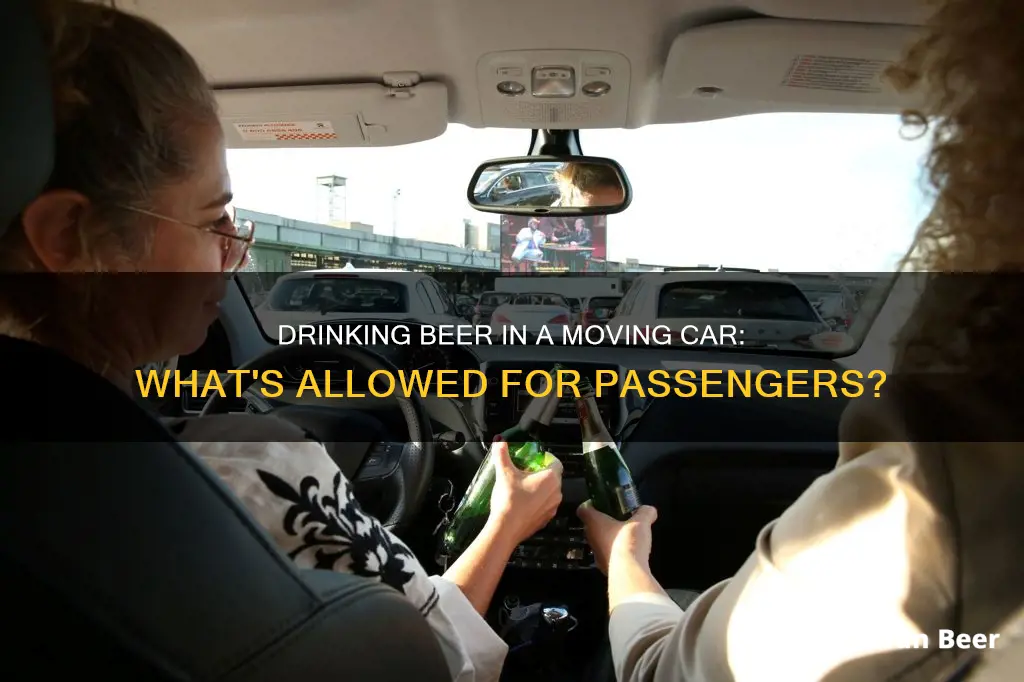
Drinking and driving is dangerous and illegal, but what about drinking as a passenger? Well, it depends on where you are. Most states prohibit drinking alcohol in vehicles, but some have exceptions. Generally, drinking as a passenger on private property is allowed, and motorhomes and hired vehicles like taxis are also exempt from the law. However, in most states, passengers cannot drink alcohol in a car, even if the vehicle is parked.
| Characteristics | Values |
|---|---|
| Can passengers drink beer in a car? | In most states, passengers are not allowed to drink beer in a car. However, there are exceptions in Connecticut, Delaware, Missouri, Mississippi, Tennessee, Virginia, Rhode Island, Alaska, Louisiana, and West Virginia. |
| Where are passengers allowed to drink beer in a car? | Passengers are generally allowed to drink beer in a car on private property. They are also allowed to drink in the living areas of motorhomes and hired vehicles such as taxis, limousines, and party buses. |
| What is considered an open container? | An open container is any container with a broken seal, a missing cap, or some contents removed. It does not need to be open and can be considered open even if the lid is on. |
| Where can open containers be stored in a car? | Open containers can be stored in the trunk, locked glove compartment, or any area of the car that is not readily accessible to the driver or passengers. |
| What are the penalties for violating open container laws? | Penalties vary by state but can include fines, jail time, license suspension, and community service. |
What You'll Learn

Open container laws by state
Open container laws vary from state to state in the US. These laws regulate or prohibit drinking alcohol in public by limiting the existence of open alcoholic beverage containers in certain areas, as well as the active consumption of alcohol in those areas.
In most states, passengers are not allowed to consume alcohol in a motor vehicle, or even to have an open container of alcohol in the car. However, there are some exceptions to this. In Connecticut, Delaware, Missouri, Tennessee, and Virginia, passengers can drink in the car without restriction. In Alaska, an open container is permitted behind a solid partition that separates the driver from the area occupied by passengers, so passengers in that area can drink. In Mississippi, the most permissive state, drivers can drink from an open bottle as long as they remain under the legal blood alcohol concentration (BAC) limit.
In nearly every state, open containers are not allowed in the passenger area of the car. This includes any part of the car where a passenger can legally ride. However, open containers are generally allowed in the trunk of a vehicle, or, if the vehicle has no trunk, in an area not readily accessible to the driver or passengers.
Some states also allow open containers in certain types of vehicles. For example, open containers are permitted in the living quarters of motorhomes, campers, or recreational vehicles. Additionally, passengers are typically allowed to drink alcohol and possess open containers in vehicles for hire, such as limousines and party buses.
The penalties for open container violations vary from state to state but can include fines, jail time, license demerit points, and community service.
Drinking Beer in Your Front Yard: Legal or Not?
You may want to see also

Drinking in a car on private property
In general, drinking in a car on private property is permitted in the following states: Connecticut, Delaware, Missouri, Tennessee, Virginia, West Virginia, and Mississippi. Additionally, Alaska allows open containers "behind a solid partition separating the driver from the passenger area."
It is important to note that even in states with more relaxed open container laws, there are still restrictions. For example, in Mississippi, drivers can only drink from an open container if they remain under the legal blood alcohol concentration (BAC) limit. In Virginia, having an open container in the car creates a presumption that the driver has been drinking, which can be rebutted with evidence.
Furthermore, local ordinances may also impact whether drinking in a car on private property is allowed. For example, in the French Quarter of New Orleans, known for its drive-thru frozen cocktail vendors, drivers and passengers are allowed to have open containers as long as the driver is not drinking.
To fully understand the laws regarding drinking in a car on private property, it is essential to research the specific state and local laws that apply to your location. These laws are subject to change, so it is always a good idea to stay informed about the most recent legislation.
Breastfeeding and Beer: Is One Drink Okay for Baby?
You may want to see also

Drinking in hired vehicles
Drinking in a hired vehicle is a different matter from drinking in a car. While most states have laws prohibiting passengers and drivers from drinking alcohol or possessing an open container of alcohol in a vehicle, there are exceptions for certain types of vehicles.
Passengers are allowed to drink alcohol and possess open containers in hired vehicles such as limousines, party buses, and taxis. This is because these vehicles are considered paid vehicles and are therefore exempt from open container laws. However, it is important to note that passengers must still be at least 21 years of age to drink alcohol in these vehicles.
In addition to hired vehicles, there are also exceptions for certain parts of all vehicles. Open containers can be kept in the trunk of a vehicle or, if the vehicle has no trunk, in an area not readily accessible to the driver or passengers.
When it comes to drinking in a car, the laws vary by state. While most states prohibit drinking alcohol or possessing open containers in a vehicle, some states such as Connecticut, Delaware, Missouri, and Mississippi, don't have open container restrictions. Additionally, states like Tennessee, Virginia, and Rhode Island, don't have open container rules that apply to vehicle passengers.
It's important to note that even in states with open container laws, there are exceptions for private property. Passengers can drink alcohol in a car parked or operating on private property without restriction.
Ginger Beer: Healthy Daily Habit or Best in Moderation?
You may want to see also

Drinking in motorhomes
Drinking in a motorhome is allowed in most states, as long as it takes place in the living area of the vehicle. This is because motorhomes are considered similar to limousines and party buses, where passengers are generally allowed to possess and consume open containers of alcohol.
However, it's important to note that the laws regarding open containers of alcohol in vehicles vary from state to state. While some states have a broad ban on any open containers in the vehicle, others only prohibit the driver from possessing or consuming alcohol and allow passengers to do so. Additionally, some states have no open container restrictions at all.
In general, an open container is defined as an alcoholic beverage with a broken seal, a missing cap, or some contents removed. It is important to be aware of the specific open container laws in your state, as well as any local ordinances that may apply. While drinking in a motorhome may be allowed in your state, other restrictions, such as age limits, may still apply.
Drinking Beer in Your Car: Missouri's Laws Explained
You may want to see also

Drinking in a car as a minor
Drinking in a car, whether as a driver or a passenger, is illegal in most states. However, this does not prevent minors from drinking in cars, and it is a problem that has sparked concern in the US.
In the US, a minor is considered anyone under the age of 21. It is illegal for a minor to possess or purchase alcohol. If a minor is found in possession of alcohol in a motor vehicle, the police officer can summon the minor to appear at a hearing at the Department of Motor Vehicles (DMV). If the hearing finds that the minor knew or had reason to know that alcohol was in the vehicle, their license may be revoked for up to 60 days. If the minor does not yet have a license, the issuance of a new license will be delayed for the same period.
There are some exceptions to the law. For example, a minor may possess alcohol if they are accompanied by a parent or guardian, or if they are working for someone with an off-site liquor sales license. In Connecticut, a minor may also possess alcohol if they are over 18 and their employment involves services for a liquor permit holder.
The penalties for possession of alcohol by a minor vary depending on the state and the circumstances. In some states, a first violation of the possession prohibition will be an infraction, while a second or subsequent violation will result in a fine. In California, for example, a minor may face a fine of up to $1,000 and a suspension of their driving privilege for one year.
It is important to note that the laws regarding alcohol possession and consumption by minors in the US are complex and can vary from state to state. The information provided here is a general overview, and specific laws and regulations may differ depending on the jurisdiction.
Whiskey and Beer: Mixing Alcohol Safely?
You may want to see also
Frequently asked questions
It depends on the state and the circumstances of your interaction with law enforcement. Most states have laws prohibiting passengers from drinking alcohol in a car, but there are exceptions. For example, in Connecticut, Delaware, Missouri, and Mississippi, there are no open container restrictions. In Alaska, passengers can drink if the beer is "behind a solid partition that separates the vehicle driver from the area normally occupied by passengers".
An open container is any container of alcohol with a broken seal. This includes containers that have had some of their contents removed, even if they are not currently open.
The penalties for violating open container laws vary by state. In some states, you may face a small fine, while in others, you could receive jail time or lose your driving privileges.







